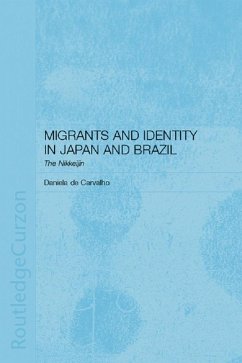The closed nature of Japan's social history means that the effect of return migration' can clearly be seen. Japan is to some extent a unique sociological specimen owing to the absence of any tradition of receiving immigrants. This book is first of all about migration, but also covers the important related issues of ethnic identity and the construction of ethnic communities. It addresses the issues from the dual perspective of Japan and Brazil. The findings suggest that mutual contact has led neither to a state of conflict nor to one of peaceful coexistence, but rather to an assertion of difference. It is argued that the "Nikkeijin" consent strategically to the social definitions imposed upon their identities and that the issue of the "Nikkeijin" presence is closely related to the emerging diversity of Japanese society.
Dieser Download kann aus rechtlichen Gründen nur mit Rechnungsadresse in A, B, BG, CY, CZ, D, DK, EW, E, FIN, F, GR, HR, H, IRL, I, LT, L, LR, M, NL, PL, P, R, S, SLO, SK ausgeliefert werden.









